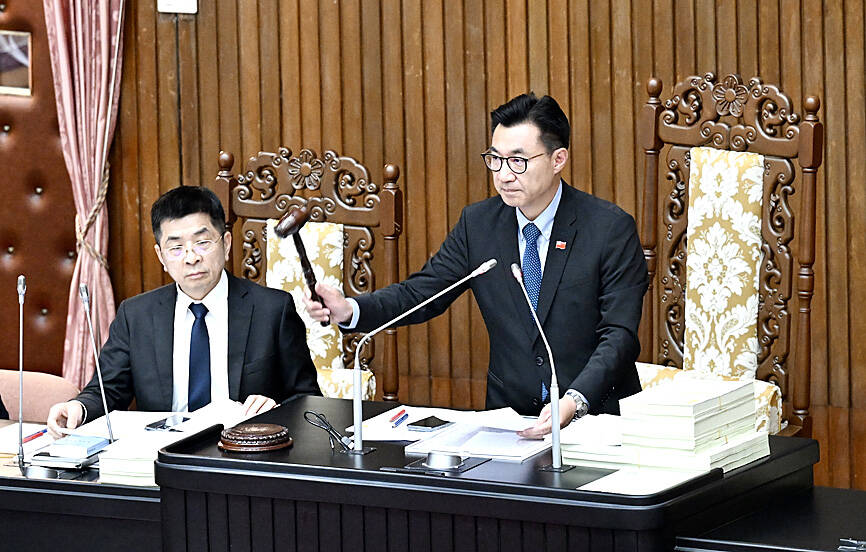The legislature yesterday passed the third reading of a draft fraud prevention act, which would stipulate prison terms and fines of increasing severity depending on the amount of money involved.
Groups or individuals who make NT$5 million (US$153,558) or more in illicit income would face a maximum prison term of 10 years and a NT$30 million fine, while those who make NT$100 million or more would face a maximum of 12 years of jail alongside a NT$300 million fine, the bill says.
The draft is part of a package aimed at combating fraud that the Executive Yuan approved on May 9. The package also includes a draft technological investigation and assurances act, amendments to the Communication Security and Surveillance Act (通訊保障及監察法) and draft amendments to the Money Laundering Control Act (洗錢防治法).

Photo: Lo Pei-de, Taipei Times
Individuals who turn themselves in would be eligible for a reduced sentence if they turned in all of the illicit proceeds, while information leading to the arrest of a ringleader and confiscation of all illegal proceeds would qualify for exemption from prosecution, the draft fraud prevention act says.
If it is signed by the president and promulgated, the act would distinguish between financial, telecommunications and digital economic fraud.
A financial institute can restrict or control access to savings accounts, electronic payment accounts, credit cards or virtual assets accounts if it suspects the tools are being used in a fraud scheme, the bill says.
They can also, upon notification by the judiciary or police, return funds or virtual assets to people whose accounts have been temporarily frozen due to fraud investigations, it says.
To help prevent overseas roaming cards and prepaid cards from being used in scams, telecoms would be ordered to disable international roaming services if there is no record of the purchaser entering Taiwan, it says.
False information submitted by an applicant for an overseas roaming card or suspicious activity by the account would result in restrictions on or suspended services, the bill says.
Internet advertising platforms of a certain size must not distribute fraudulent content, it says.
If business owners learn that a commercial or advertisement is fraudulent, they should take down the content and provide the police with information about who purchased and financed it, with a deadline on their response after being notified by the government, it says.
The Executive Yuan should establish a central government fraud prevention committee to meet quarterly, with the position of convener going to the premier or vice premier, the bill says.
Committee members should be made up of ministers without portfolio, other government officials and fraud prevention experts, it says.

MAKING WAVES: China’s maritime militia could become a nontraditional threat in war, clogging up shipping lanes to prevent US or Japanese intervention, a report said About 1,900 Chinese ships flying flags of convenience and fishing vessels that participated in China’s military exercises around Taiwan last month and in January last year have been listed for monitoring, Coast Guard Administration (CGA) Deputy Director-General Hsieh Ching-chin (謝慶欽) said yesterday. Following amendments to the Commercial Port Act (商港法) and the Law of Ships (船舶法) last month, the CGA can designate possible berthing areas or deny ports of call for vessels suspected of loitering around areas where undersea cables can be accessed, Oceans Affairs Council Minister Kuan Bi-ling (管碧玲) said. The list of suspected ships, originally 300, had risen to about

DAREDEVIL: Honnold said it had always been a dream of his to climb Taipei 101, while a Netflix producer said the skyscraper was ‘a real icon of this country’ US climber Alex Honnold yesterday took on Taiwan’s tallest building, becoming the first person to scale Taipei 101 without a rope, harness or safety net. Hundreds of spectators gathered at the base of the 101-story skyscraper to watch Honnold, 40, embark on his daredevil feat, which was also broadcast live on Netflix. Dressed in a red T-shirt and yellow custom-made climbing shoes, Honnold swiftly moved up the southeast face of the glass and steel building. At one point, he stepped onto a platform midway up to wave down at fans and onlookers who were taking photos. People watching from inside

Japan’s strategic alliance with the US would collapse if Tokyo were to turn away from a conflict in Taiwan, Japanese Prime Minister Sanae Takaichi said yesterday, but distanced herself from previous comments that suggested a possible military response in such an event. Takaichi expressed her latest views on a nationally broadcast TV program late on Monday, where an opposition party leader criticized her for igniting tensions with China with the earlier remarks. Ties between Japan and China have sunk to the worst level in years after Takaichi said in November that a hypothetical Chinese attack on Taiwan could bring about a Japanese

The WHO ignored early COVID-19 warnings from Taiwan, US Deputy Secretary of Health and Human Services Jim O’Neill said on Friday, as part of justification for Washington withdrawing from the global health body. US Secretary of State Marco Rubio on Thursday said that the US was pulling out of the UN agency, as it failed to fulfill its responsibilities during the COVID-19 pandemic. The WHO “ignored early COVID warnings from Taiwan in 2019 by pretending Taiwan did not exist, O’Neill wrote on X on Friday, Taiwan time. “It ignored rigorous science and promoted lockdowns.” The US will “continue international coordination on infectious